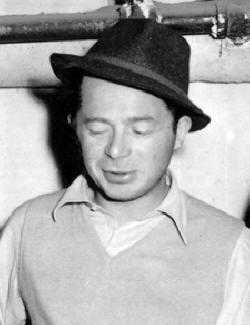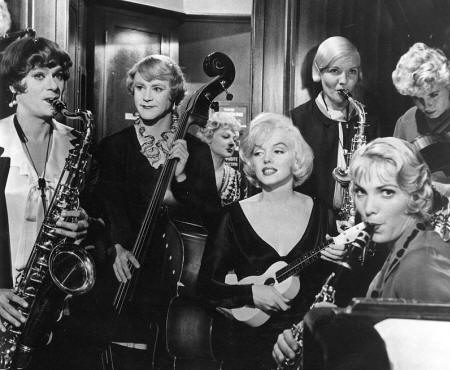

Queer Places:
Pierce Brothers Westwood Village Memorial Park and Mortuary, 1218 Glendon Ave, Los Angeles, CA 90024
 Billy Wilder (born Samuel Wilder; June 22, 1906 – March 27, 2002) was an Austrian-American film director, producer and screenwriter. His career in Hollywood spanned five decades, and he is regarded as one of the most brilliant and versatile filmmakers of Classical Hollywood cinema.
He became a screenwriter while living in Berlin. After the rise of the Nazi Party, he moved to Paris, due to rampant antisemitism and discrimination against the Jewish people. He moved to Hollywood in 1933, and had a major hit when he wrote the screenplay with
Charles Brackett and Walter Reisch for the Academy Award nominated film Ninotchka (1939). Wilder established his directorial reputation with an adaptation of James M. Cain's Double Indemnity (1944), a film noir. Wilder co-wrote the screenplay with crime novelist Raymond Chandler. Wilder earned the Best Director and Best Screenplay Academy Awards for the adaptation of
Charles R. Jackson's novel, The Lost Weekend (1945).
In the 1950s, Wilder directed a string of critically acclaimed films, including the Hollywood drama film Sunset Boulevard (1950), the noir film Ace in the Hole (1951), Stalag 17 (1953), and Sabrina (1954). Wilder directed three films in 1957, including The Spirit of St. Louis, Love in the Afternoon and Witness for the Prosecution. Wilder collaborated with
Marilyn Monroe on a few films,
including The Seven Year Itch (1955) and Some Like It Hot (1959).[1] In the
1960s, Wilder directed the romance film The Apartment (1960), which received a
critical and commercial success. It won the Academy Award for Best Picture,
with Wilder becoming the first person to win Academy Awards as producer,
director and screenwriter. Toward the end of his career, Wilder directed a few
comedy films, starring Lemmon and Walter Matthau. Other films including One,
Two, Three (1961), Irma la Douce (1963), The Fortune Cookie (1966) and Avanti!
(1972).
Billy Wilder (born Samuel Wilder; June 22, 1906 – March 27, 2002) was an Austrian-American film director, producer and screenwriter. His career in Hollywood spanned five decades, and he is regarded as one of the most brilliant and versatile filmmakers of Classical Hollywood cinema.
He became a screenwriter while living in Berlin. After the rise of the Nazi Party, he moved to Paris, due to rampant antisemitism and discrimination against the Jewish people. He moved to Hollywood in 1933, and had a major hit when he wrote the screenplay with
Charles Brackett and Walter Reisch for the Academy Award nominated film Ninotchka (1939). Wilder established his directorial reputation with an adaptation of James M. Cain's Double Indemnity (1944), a film noir. Wilder co-wrote the screenplay with crime novelist Raymond Chandler. Wilder earned the Best Director and Best Screenplay Academy Awards for the adaptation of
Charles R. Jackson's novel, The Lost Weekend (1945).
In the 1950s, Wilder directed a string of critically acclaimed films, including the Hollywood drama film Sunset Boulevard (1950), the noir film Ace in the Hole (1951), Stalag 17 (1953), and Sabrina (1954). Wilder directed three films in 1957, including The Spirit of St. Louis, Love in the Afternoon and Witness for the Prosecution. Wilder collaborated with
Marilyn Monroe on a few films,
including The Seven Year Itch (1955) and Some Like It Hot (1959).[1] In the
1960s, Wilder directed the romance film The Apartment (1960), which received a
critical and commercial success. It won the Academy Award for Best Picture,
with Wilder becoming the first person to win Academy Awards as producer,
director and screenwriter. Toward the end of his career, Wilder directed a few
comedy films, starring Lemmon and Walter Matthau. Other films including One,
Two, Three (1961), Irma la Douce (1963), The Fortune Cookie (1966) and Avanti!
(1972).

Curtis, Lemmon and Monroe in Some Like it Hot
In 1959, Wilder reunited with Monroe in the United Artists released Prohibition-era farce Some Like It Hot. The film was released without however, a Production Code seal of approval, withheld due to the film's unabashed sexual comedy, including a central cross-dressing theme. Jack Lemmon and Tony Curtis play musicians who disguise themselves as women to escape pursuit by a Chicago gang. Curtis's character courts a singer played by Monroe, while Lemmon is wooed by Joe E. Brown – setting up the film's final joke in which Lemmon reveals that his character is a man and Brown blandly replies "Well, nobody's perfect". A box office success, the film was lightly regarded during its original release. But its critical reputation grew prodigiously; in 2000, the American Film Institute selected it as the best American comedy ever made.[20] In 2012, the British Film Institute decennial Sight and Sound poll of the world's film critics rated it as the 43rd best movie ever made, and the second-highest-ranking comedy.[21]
Wilder died of cancer and pneumonia on March 27, 2002. He was buried at Pierce Brothers Westwood Village Memorial Park and Mortuary.[35] The French newspaper, Le Monde, titled the front-page obituary “Billy Wilder is dead. Nobody is perfect”, a reference to the final line of Some Like It Hot.[36] His tombstone reads: Billy Wilder, I'm a Writer, but then, Nobody's Perfect.
My published books: